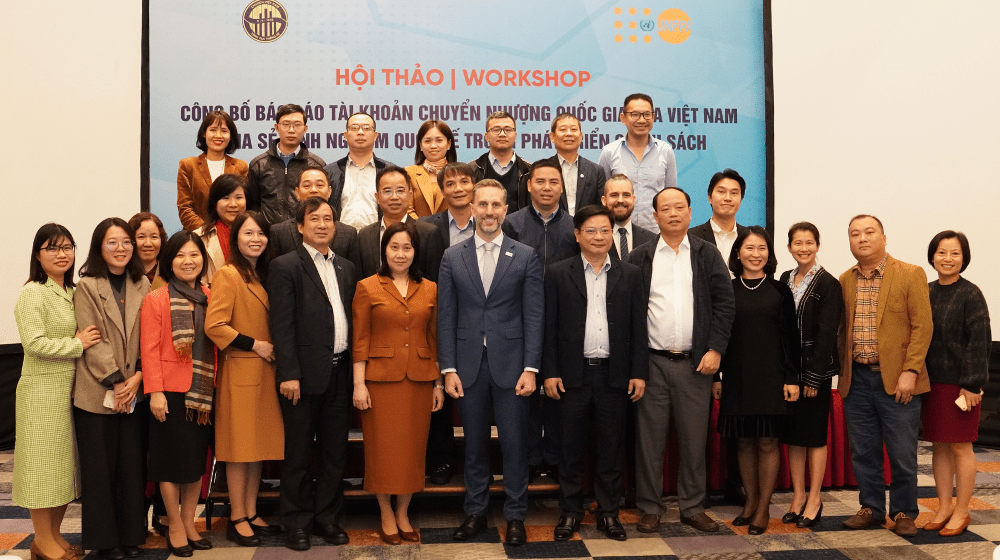Hanoi, 6 December 2023: The General Statistics Office today launched the conclusions and recommendations of Viet Nam’s research on National Transfer Accounts - a comprehensive and systematic method used to analyse the economic lifecycle of population ageing.
The General Statistics Office, Ministry of Planning and Investment conducted the research with technical and financial support from UNFPA Viet Nam. Professor Sang-Hyop Lee, Chair in the Department of Economics at the University of Hawaii at Manoa, provided training for the GSO team to produce the NTA estimate for Viet Nam.
The National Transfer Accounts (NTA) estimation is significant as they contribute to enhancing understanding of the economic aspects of population aging in society, including the interconnection of incomes and consumption among children, working adults and older persons.
In her opening remarks at the workshop, Dr Nguyen Thi Huong, Director General of the General Statistics Office expressed the important role of this research. She said: “The National Transfer Accounts is a comprehensive and systematic method used to used to analyze the economic lifecycle, contributing to an enhanced understanding of population generations and demographic characteristics, and how each generation affects economic growth and development. Study of the National Transfer Accounts has been conducted in more than 70 countries. This method proves to be a good tool to quantify economic flow across different age groups and to provide evidence for key macro policy making, taking the population as the centre.”
Viet Nam’s population pyramid in 2019 shows that the country is currently in a demographic window of opportunity which will end by 2039. Viet Nam is also one of the most rapidly ageing countries in the region with a projected transition from “population ageing” to “aged population” that will be much shorter than for other countries. The rapid ageing of Viet Nam's population creates both opportunities and challenges for the economy as well as affecting various socio-economic issues.
Following the NTA approach, the demographic dividend that a country could harness is not only based on the age structure of the population but also depends on the difference between actual labour income and consumption.
The results of the NTA study indicate that Viet Nam has moved from the first demographic dividend, based largely on the volume of the workforce, to a second demographic dividend which requires more active interventions in economic, health and education policies.
While no longer having the advantage of the first demographic dividend, Viet Nam can implement comprehensive socio-economic solutions to increase labour productivity and encourage higher labor force participation rates, thus achieving the benefits of the second demographic dividend.
The NTA study indicates that, in case of well - implementing the economic and social development strategies stated at Decision No. 1305/QD-TTg dated November 8, 2023, of the Prime Minister of Viet Nam, the country can achieve an average labour productivity growth rate of 6.5% per year for the periods 2023- 2030, higher than the labour productivity growth rate in 2022 by 1.7 percentage points.
The increase in labour productivity will lead to increase the economic support ratio, which could help Viet Nam attain the second demographic dividend by around 2040.
Mr. Matt Jackson, the UNFPA Representative in Vietnam, said that UNFPA will continue to support the General Statistics Office in conducting specific research and studies to ensure quality of data and statistics. Matt Jackson said: “Investment in the National Transfer Accounts helps develop policies and interventions that prepare for an ageing population. NTA provides a way to assess the impact of demographic changes including on national income and public spending, consumption, saving, and investment. This data helps policymakers address important policy questions related to economic growth, fiscal sustainability, and generational equity.”
The population's age structure remains the most crucial factor influencing NTA outcomes. Therefore, maintaining and effectively implementing population policies is essential. Experience from many countries shows that population policies are often underrated in their actual importance and are not given the deserved priority in investment.
The research findings aim to help the Government of Viet Nam to consider investment in population policies to ensure sustainable development so that “no one is left behind”./.
For further information, please contact:
General Statistics Office | Email: dansolaodong@gso.gov.vn | ĐT: 024 7304 6666
Ms Dinh Thu Huong | UNFPA Communications | Email: dhuong@unfpa.org | Tel: 0913093363



